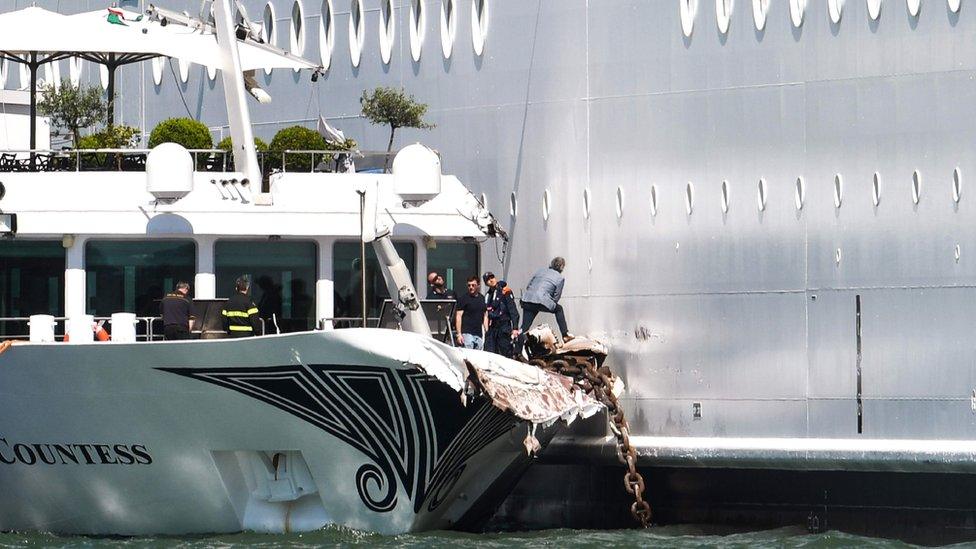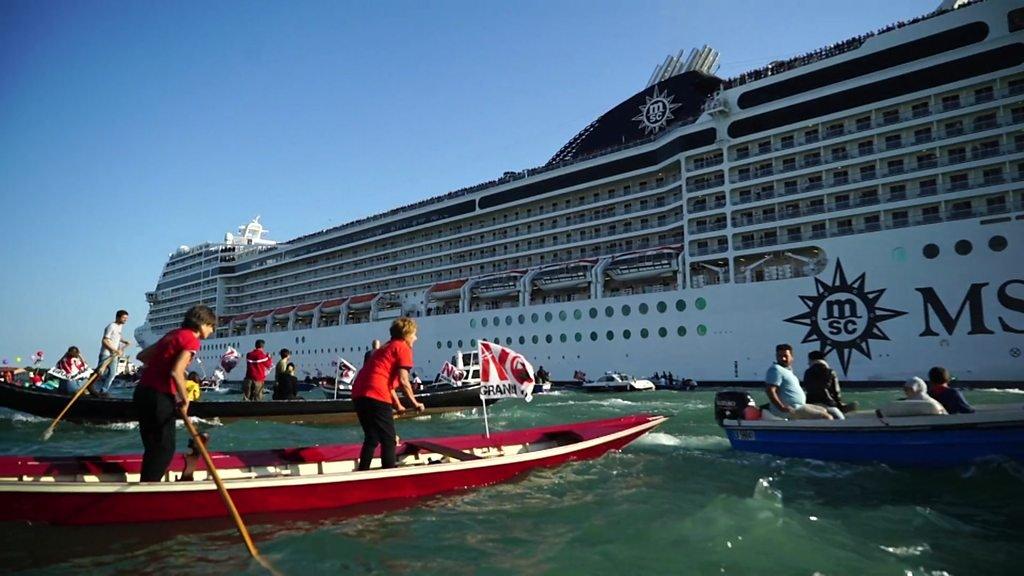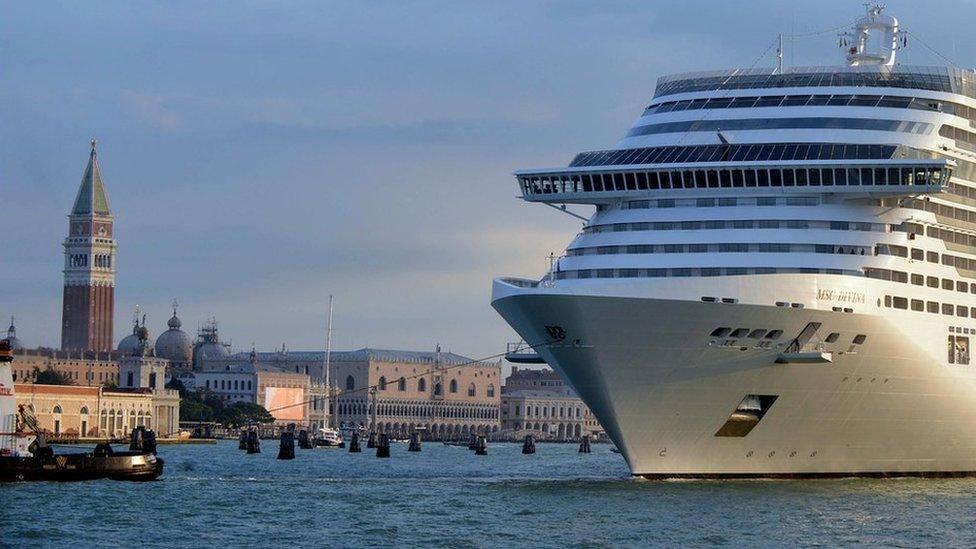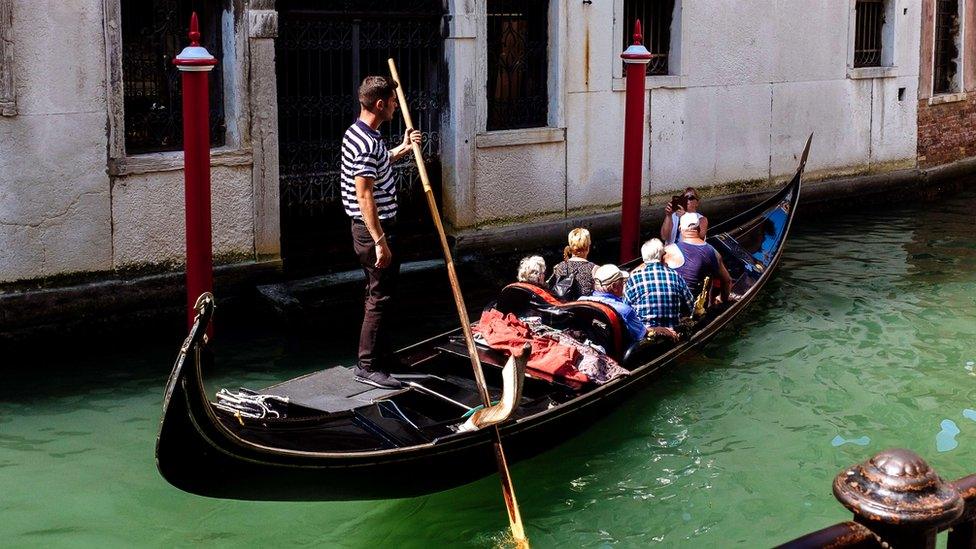Venice crash captain ordered 'all procedures to avoid impact'
- Published
The MSC Opera, its horns blaring, crashes into a boat moored at a wharf in San Basilio-Zattere.
A recording has emerged of the captain of a cruise ship describing an engine fault causing the vessel to crash into a tourist boat in Venice on Sunday.
In a conversation with the harbour master, the captain of the MSC Opera says that dropping two anchors was not enough because the engine was "locked".
"We have activated all possible procedures to avoid impact," he says.
The crash left four people hurt and has reignited calls to ban large vessels from the city's Giudecca canal.
The Giudecca, which passes close to the popular St Mark's Square, is one of Venice's major waterways.
What caused the crash?
In the voice recording, the captain of the 275m-long (900ft) ship is heard describing what had been done in an attempt to bring the vessel to a standstill after losing control.

"We put the tugboats in position to widen the gap [between the boat and the deck]," he says, adding that at some point cables attached to the tugboats had broken.
The head of the tugboat association involved in guiding the ship into its berth, Davide Calderan, confirmed the engine failure and said the captain had reported it "immediately".
"The engine was blocked, but with its thrust on, because the speed was increasing," he said.

The damaged River Countess tourist boat after it was hit by the MSC Opera
In footage of the incident, the ship's horn can be heard blaring in an attempt to warn tourists on board a docked boat ahead of impact.
How has the government reacted?
The incident has sparked a row between Italy's two ruling parties. Italian Deputy Prime Minister Matteo Salvini of the right-wing League party blamed the populist Five Star Movement for stifling progress to resolve the issue.
Mr Salvini told a rally that a solution to prevent such accidents - the enlargement of part of the canal and moving some cruise ships to an area of the mainland in Porto Marghera - had been developed and shared last year, but the plans had been blocked "because a 'no' was received from a ministry, and it was not a ministry of the League".

The Five Star Movement said in response that "if the League has a plan to solve everything tomorrow, they should present it", adding that they had seen no proposal from the party.
Infrastructure Minister Danilo Toninelli, who is part of Five Star, said that moving liners to the industrial area of Marghera was not a viable solution because it would risk "a cruise ship and an oil tanker colliding".
He said it could also lead to photos and postcards showing groups of tourists standing in front of large petrochemical factories instead of the Unesco World Heritage city itself.
But in an earlier tweet he agreed that the incident was proof that big ships should not travel on the Giudecca., external
"After many years of inertia, we are finally close to a definitive solution to protect both the lagoon and tourism," he said, without giving details.
On Sunday, Venice Mayor Luigi Brugnaro urged immediate action to open the alternative channel in the city, known as the Vittorio Emanuele III.
Environment Minister Sergio Costa tweeted: "What happened in the port of Venice is confirmation of what we have been saying for some time."
"Cruise ships must not sail down the Giudecca. We have been working on moving them for months now... and are nearing a solution."
What do critics say about ship traffic?
Critics say large ships such as the MSC Opera pose a conservation risk to the lagoon city, pollute its waters and mar its beauty.
They say waves created by cruise ships on the canal erode the foundations of the city, which regularly suffers from flooding.
Some have also complained that they detract from the beauty of Venice's historic sites and bring too many tourists.
Venetians are trying to find solutions to stop the exodus from their city
Venice's port authority called for action to resolve the issue of high cruise ship traffic.
The government has previously tried to resolve the cruise ship debate. In 2013, it banned ships weighing more than 96,000 tonnes from the Giudecca canal but the legislation was later overturned.
In 2017, the government announced that it would divert larger ships away from the historic centre.
However, the plans were expected to take four years to come into force.
- Published15 October 2018

- Published16 July 2017

- Published31 December 2018
